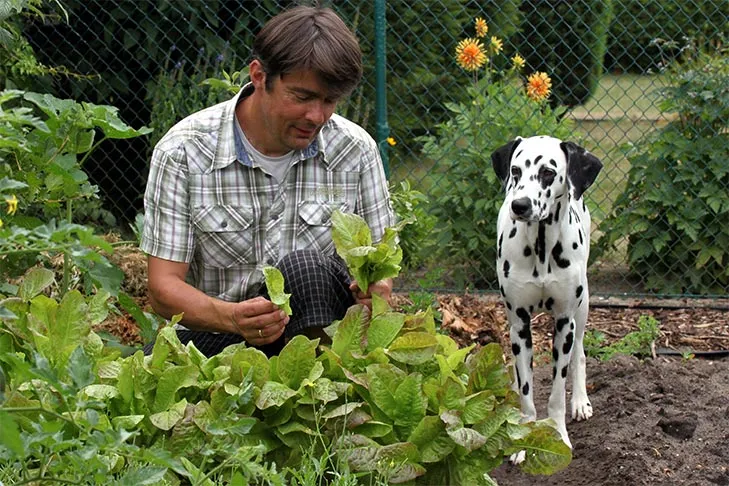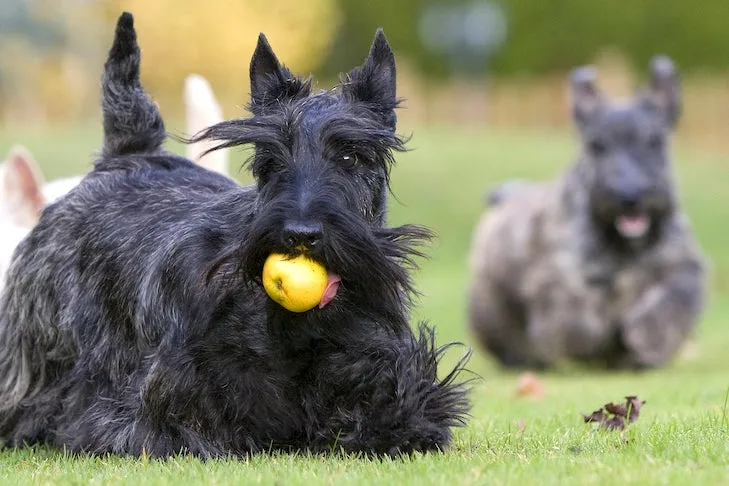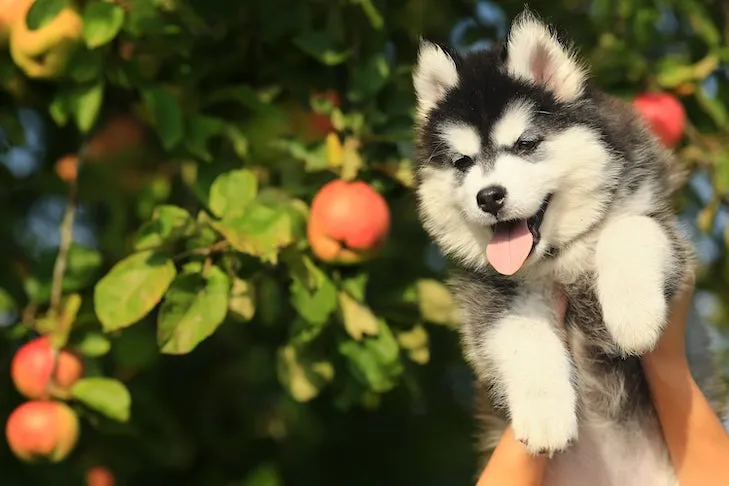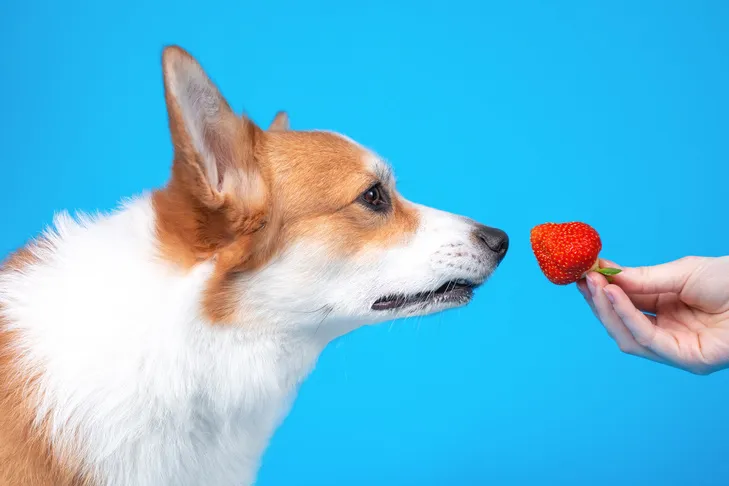As loving pet parents, we often want to share our healthy snacks with our furry companions. While the thought of sharing a bite of your favorite fruit or vegetable with your dog is tempting, it’s crucial to understand that not all human foods are safe for canines. In fact, some common fruits and vegetables can be downright dangerous, leading to severe health issues or even being fatal. Knowing What Veggies Should Dogs Not Eat – alongside which fruits are off-limits – is vital for ensuring your dog’s well-being and preventing accidental poisoning.
Dogs digest food differently than humans do, and their metabolic systems can react adversely to compounds that are harmless to us. While dogs are considered omnivores and can benefit from certain fruits and vegetables as occasional treats, these should never form a significant portion of their diet, which should be primarily composed of high-quality dog food. This comprehensive guide will walk you through the world of fruits and vegetables, detailing which ones are safe to share in moderation and, more importantly, which ones must be avoided at all costs. For a broader understanding of wholesome foods, you might also be interested in [what whole foods can dogs eat](https://dogcarestory.com/what-whole-foods-can-dogs-eat/).
Understanding Your Dog’s Dietary Needs
Before diving into specific lists, it’s helpful to remember that dogs have evolved to thrive on a diet rich in protein and fats, with carbohydrates playing a secondary role. While their diet can include some plant matter, their digestive systems are not designed to process large quantities of fruits or vegetables. When introducing any new food, especially human food, always do so in small amounts and observe your dog for any adverse reactions. Always consult your veterinarian if you have concerns about your dog’s diet or health.
Vegetables Dogs Should Avoid: The Critical List
When considering what to feed your dog, the “should not eat” list is arguably the most important. These vegetables contain compounds that are toxic to dogs, even in small amounts, and can lead to serious health complications.
Onions, Garlic, Leeks, and Chives (Allium Family)
These common kitchen staples are highly toxic to dogs and are a primary answer to what veggies should dogs not eat. Onions, garlic, leeks, and chives (all members of the Allium family) contain N-propyl disulfide, a compound that damages red blood cells, leading to hemolytic anemia. This means your dog’s red blood cells can rupture, reducing their ability to carry oxygen. Symptoms of Allium poisoning can include:
- Vomiting and diarrhea
- Lethargy and weakness
- Loss of appetite
- Pale gums
- Increased heart rate and respiratory rate
- Collapse
Even small amounts can be dangerous, especially concentrated forms like onion powder or garlic powder often found in human foods. All breeds are susceptible, though Japanese breeds like Akitas and Shiba Inus appear to be more sensitive. If you suspect your dog has ingested any amount of these vegetables, seek immediate veterinary attention. Ensure all scraps, leftovers, and seasonings containing Allium vegetables are kept far out of your dog’s reach.
Wild Mushrooms
While certain cultivated mushrooms bought from supermarkets (like cremini or button mushrooms) are generally considered safe for dogs in very small, cooked quantities, wild mushrooms are an absolute no-go. There are thousands of mushroom species, and many are highly toxic, even deadly, to dogs. Identifying toxic wild mushrooms is extremely difficult, even for experts. Ingesting poisonous wild mushrooms can lead to:
- Gastrointestinal upset (vomiting, diarrhea)
- Liver failure
- Kidney failure
- Neurological symptoms (tremors, seizures)
- Death
Always prevent your dog from foraging for mushrooms in your yard, parks, or while on walks. If you see your dog eat a wild mushroom, contact your vet or an emergency pet poison control center immediately. Take a sample of the mushroom (if safe to do so) for identification.
Unripe Tomatoes (Green Parts of the Plant)
The ripened red flesh of a tomato is generally considered safe for dogs in moderation. However, the green parts of the tomato plant – including the leaves, stems, and unripe green tomatoes – contain a toxic alkaloid called solanine. While a dog would typically need to ingest a large quantity of these green parts to become seriously ill, it’s best to err on the side of caution and keep your dog away from tomato plants, especially if they are prone to munching on garden greenery. Solanine poisoning symptoms can include:
- Gastrointestinal upset (vomiting, diarrhea)
- Lethargy
- Weakness
- Loss of coordination
If you grow tomatoes, ensure your dog cannot access the plants. Only offer small pieces of fully ripened, red tomato flesh, and always remove any green parts.
Asparagus (No Nutritional Benefit)
While asparagus is not considered toxic, it makes the “avoid” list for practical reasons. It’s tough and fibrous when raw, posing a choking hazard and being difficult for dogs to digest. Once cooked to a texture soft enough for a dog to eat, it loses most of its nutritional value. Essentially, there’s no real benefit to feeding asparagus to your dog, and other vegetables offer far more accessible nutrients without the hassle. Opt for more beneficial and easily digestible options if you want to share a vegetable treat.
Safe Vegetables for Dogs: Healthy Additions in Moderation
Many vegetables can provide valuable vitamins, minerals, and fiber to your dog’s diet when offered appropriately. Remember to always serve them plain, without seasonings, and in moderation.
Carrots
Carrots are an excellent, low-calorie snack packed with fiber and beta-carotene, which converts to vitamin A in the body. Their crunchy texture can also help clean your dog’s teeth. They are a popular ingredient in many commercial dog foods and treats. You can feed them raw or cooked, sliced into bite-sized pieces. Frozen carrot sticks make a fantastic, refreshing treat for teething puppies or dogs on hot days.
Green Beans
Plain green beans – whether chopped, steamed, raw, or canned (opt for no-salt or low-sodium varieties) – are safe for dogs. They are rich in vitamins K, C, and A, as well as essential minerals and fiber, all while being low in calories. This makes them a great filler for dogs needing to lose weight, as they provide satiety without excess calories. Frozen green beans are a favorite crunchy snack for many dogs.
Peas (Green, Snow, Sugar Snap)
Most types of peas, including green peas, snow peas, sugar snap peas, and garden or English peas, are safe for dogs. They contain a good array of vitamins (A, K, B), minerals, and are rich in protein and fiber. Fresh or frozen peas are the best options; avoid canned peas with added sodium. Always ensure they are shelled and cooked if needed, and given in moderation.
Celery
Celery is an excellent source of vitamins A, B, and C, and contains nutrients that can support heart health and even help fight cancer. An added bonus: it’s known to freshen doggy breath! Offer small, chopped pieces of fresh celery. The fibrous nature can be a bit tough, so ensure pieces are appropriately sized to prevent choking.
Broccoli
Broccoli can be safe for dogs in small quantities and is a good source of fiber and vitamin C. However, broccoli florets contain isothiocyanates, which can cause mild to severe gastric irritation in some dogs if consumed in large amounts. Also, the tough stalks can pose a choking hazard or cause esophageal obstruction. It’s best to offer small, cooked pieces of florets, always in moderation, to minimize potential issues.
Brussels Sprouts
Packed with vitamins K, C, A, B1, B6, folate, and manganese, Brussels sprouts offer a wealth of antioxidants beneficial for both humans and dogs. The main drawback? They can cause significant gas in dogs if overfed. Offer them cooked and chopped into small pieces as an occasional treat.
Spinach
Spinach is generally considered safe for dogs, but it’s not the top recommendation. It contains oxalic acid, which can interfere with calcium absorption and, in very large quantities, may contribute to kidney damage. While a dog would need to eat a substantial amount for this to be a concern, it’s often better to choose other vegetables with more direct benefits and fewer potential issues. If you do offer spinach, do so sparingly and cooked.
 Dalmatian watching a man gardening and picking leaves.
Dalmatian watching a man gardening and picking leaves.
Fruits Dogs Can Enjoy: Sweet Treats in Moderation
Fruits can be a delicious and nutritious occasional treat for dogs, offering vitamins, minerals, and antioxidants. However, due to their sugar content, they should always be given sparingly.
Apples
Apples (without seeds or core) are a fantastic source of vitamins A and C, plus fiber. They are low in protein and fat, making them ideal for older dogs. Always remove the seeds and core, as apple seeds contain small amounts of cyanide. Sliced apples or frozen apple pieces make great snacks.
 Scottish Terriers playing in the grass.
Scottish Terriers playing in the grass.
Bananas
Bananas are a great low-calorie treat rich in potassium, vitamins, biotin, fiber, and copper. They are low in cholesterol and sodium but high in sugar, so offer them in moderation as an occasional treat rather than a diet staple. Mashed banana or frozen banana slices are popular choices.
Blueberries
Often hailed as a superfood, blueberries are packed with antioxidants, fiber, and phytochemicals. They can help prevent cell damage and are a healthy, low-calorie treat. Fresh or frozen blueberries are excellent, and their small size makes them perfect for training rewards or enrichment.
Cantaloupe
Cantaloupe is loaded with nutrients, low in calories, and a good source of water and fiber, making it refreshing. However, it’s high in sugar, so moderation is key, especially for overweight dogs or those with diabetes. Small cubes or frozen balls of cantaloupe are great for a summer snack.
Cranberries
Both fresh and dried cranberries are safe in small quantities. They contain antioxidants and can be a tart treat some dogs enjoy. Be mindful that many dried cranberries for human consumption are heavily sweetened; opt for unsweetened fresh or frozen varieties. Too many can cause an upset stomach.
Cucumbers
Cucumbers are an excellent choice for dogs, especially those needing to lose weight, as they are very low in carbohydrates and fat and high in water content for hydration. They also provide vitamins K, C, and B1, potassium, copper, magnesium, and biotin. Sliced or frozen cucumber pieces are refreshing.
 Dog cucumber
Dog cucumber
Mango
This sweet, tropical fruit is a good source of vitamins A, B6, C, and E, as well as potassium and carotenes. Always remove the hard pit, as it contains small amounts of cyanide and is a significant choking hazard. Mango is high in sugar, so offer it as an occasional treat.
Oranges
Veterinarians consider oranges safe for dogs, offering vitamin C, potassium, and fiber. However, many dogs are put off by the strong citrus smell and taste. If your dog enjoys them, offer small quantities of the juicy flesh, fully peeled and seedless. The peel is difficult to digest and contains oils that can upset their stomach.
Peaches
Small amounts of fresh or frozen peach flesh (without the pit) are a good source of fiber and vitamin A. Similar to cherries, peach pits contain cyanide and are a choking risk. Ensure the pit is completely removed and disposed of safely. Avoid canned peaches due to high sugar content.
 Siberian Husky puppy being held up in front of an apple tree.
Siberian Husky puppy being held up in front of an apple tree.
Pears
Pears are a good snack, rich in copper, vitamins C and K, and fiber. Like apples, always remove the core and seeds, as pear seeds contain traces of cyanide. Cut the flesh into bite-sized chunks. Avoid canned pears with added syrups.
Pineapple
Fresh pineapple chunks (with the prickly peel and crown removed) are a sweet treat full of vitamins, minerals, and fiber. It also contains bromelain, an enzyme that aids protein absorption. Avoid canned pineapple in sugary syrups.
Pumpkin
Pure pumpkin puree is a superfood for dogs, loaded with antioxidants. It’s particularly famous for its ability to regulate digestion, helping with both diarrhea and constipation. Always use 100% pure canned pumpkin (not pumpkin pie filling, which contains spices and sugar) or roast fresh pumpkin yourself.
Raspberries
Raspberries are safe in moderation and offer antioxidants beneficial for dogs. They are low in sugar and calories but high in fiber, manganese, and vitamin C. Their anti-inflammatory properties make them particularly good for senior dogs with aging joints. However, raspberries contain small, naturally occurring amounts of xylitol, so limit your dog to a small handful (no more than 8 ounces).
Strawberries
Strawberries are rich in fiber and vitamin C, and even contain an enzyme that can help whiten your dog’s teeth. Like all fruits, they contain natural sugar, so offer them in moderation. Frozen strawberries make a fun, cooling treat.
 Pembroke Welsh Corgi and strawberry
Pembroke Welsh Corgi and strawberry
Watermelon
Watermelon flesh is safe and hydrating for dogs, especially on hot days, as it’s 92% water. It’s also packed with vitamins A, B-6, and C, and potassium. Crucially, always remove the rind and seeds, as these can cause intestinal blockage and are difficult to digest.
Fruits Dogs Should Avoid: Hidden Dangers
Just like certain vegetables, some fruits are highly toxic or hazardous to dogs due to specific compounds or physical risks. For more detailed information on specific fruit types, you might consult resources like [what fruits can shih tzus not eat](https://dogcarestory.com/what-fruits-can-shih-tzus-not-eat/).
Avocado
While a healthy fat source for humans, avocado should generally be avoided for dogs. The pit, skin, and leaves of avocados contain persin, a fungicidal toxin. While the flesh has less persin, it can still be enough to cause gastrointestinal upset (vomiting and diarrhea) in some dogs. Avocado flesh is also high in fat, which can lead to pancreatitis in sensitive dogs if consumed in large quantities. The large pit is also a choking hazard.
Cherries
With the exception of the fleshy fruit around the seed, cherry plants (leaves, stems, and especially the pits) contain cyanide, which is highly toxic to dogs. Cyanide interferes with cellular oxygen transport, leading to oxygen deprivation in the body’s cells. Symptoms of cyanide poisoning include dilated pupils, difficulty breathing, and red gums, requiring immediate emergency veterinary care. Always remove pits and ensure your dog cannot access fallen cherries from trees.
Grapes and Raisins
Grapes and raisins are perhaps one of the most infamous and dangerous fruits for dogs. They are highly toxic to all dogs, regardless of breed, age, or sex. Even a small amount can lead to acute kidney failure. The exact toxic compound is still unknown, but the effects are severe and potentially fatal. Symptoms can include:
- Vomiting (often within a few hours)
- Diarrhea
- Lethargy
- Dehydration
- Abdominal pain
- Decreased urination or absence of urination (indicating kidney failure)
If you suspect your dog has eaten any grapes or raisins, contact your veterinarian or an emergency pet poison control center immediately. Time is critical for preventing kidney damage. Keep all grapes and raisins secured and out of reach, especially from children who might inadvertently drop them.
General Guidelines for Feeding Human Foods to Dogs
To keep your canine companion safe and healthy when sharing human foods, keep these guidelines in mind:
- Moderation is Key: Treats, even healthy ones, should make up no more than 10% of your dog’s daily caloric intake.
- Preparation Matters: Always wash fruits and vegetables thoroughly. Remove pits, seeds, cores, rinds, and any toxic parts. Cut food into small, bite-sized pieces to prevent choking.
- Plain is Best: Never feed seasoned, salted, sugared, or otherwise prepared human foods to your dog. Many seasonings (like garlic or onion powder) are harmful.
- Introduce Slowly: When introducing a new fruit or vegetable, start with a tiny amount to check for any allergic reactions or digestive upset.
- Observe for Reactions: Monitor your dog for any signs of discomfort, vomiting, diarrhea, or unusual behavior after eating a new food.
- Consult Your Vet: Always speak with your veterinarian before making significant changes to your dog’s diet or if you have any doubts about a particular food. They can provide personalized advice based on your dog’s specific health needs. If your dog is a picky eater, learning
[my dog is a picky eater what can i do](https://dogcarestory.com/my-dog-is-a-picky-eater-what-can-i-do/)can also provide valuable tips. - Know the Risks: Be aware of common human foods that are toxic to dogs beyond just fruits and vegetables. For a more comprehensive list, refer to
[what not to give a dog to eat](https://dogcarestory.com/what-not-to-give-a-dog-to-eat/).
Conclusion
Feeding your dog a balanced diet primarily formulated for canines is the best way to ensure their nutritional needs are met. However, sharing small, vet-approved portions of certain fruits and vegetables can be a wonderful way to offer variety and enhance their enjoyment, providing extra vitamins and fiber. The most important lesson is to understand what veggies should dogs not eat and which fruits are strictly off-limits. Items like onions, garlic, grapes, raisins, avocado, and cherry pits pose serious health risks and must be entirely avoided.
Always prioritize your dog’s safety by educating yourself on safe and unsafe foods, preparing treats correctly, and practicing moderation. When in doubt, it’s always safest to stick to their regular dog food or consult your veterinarian. Your vigilance ensures your beloved companion stays happy, healthy, and safe from harmful ingredients. Remember, a little knowledge goes a long way in providing the best care for your furry friend!
